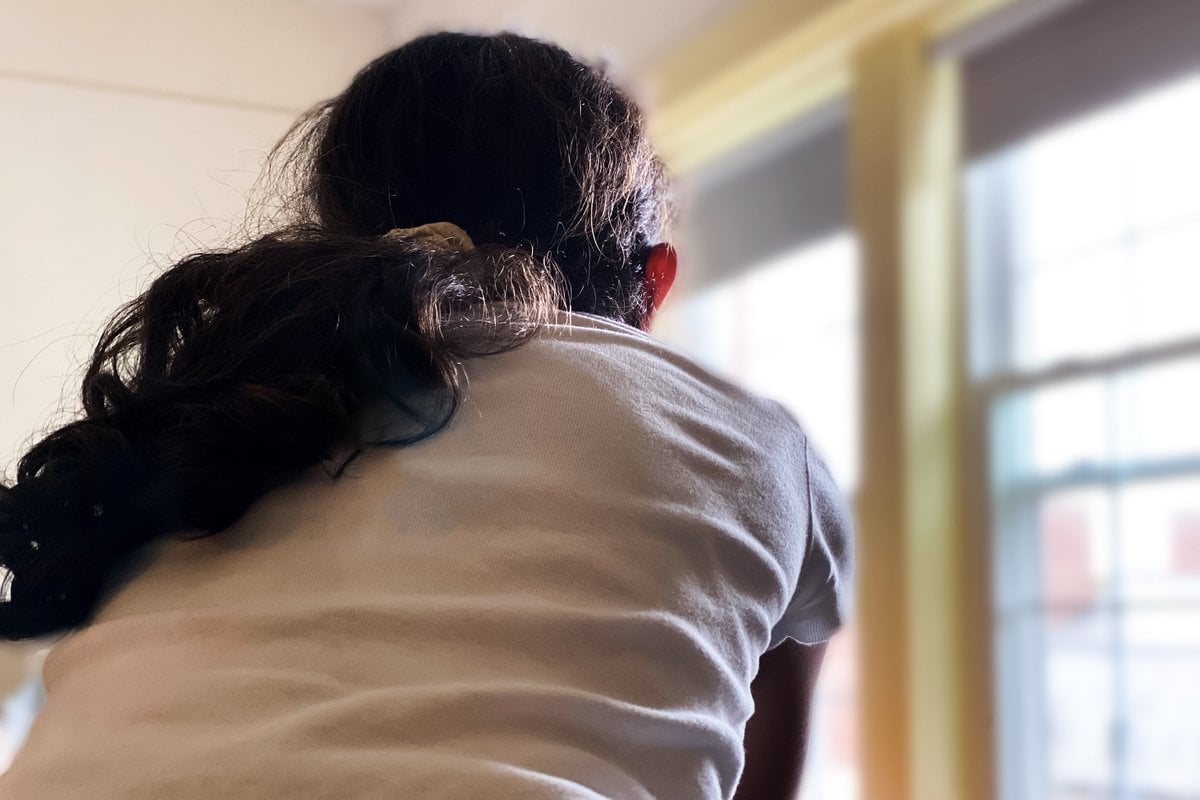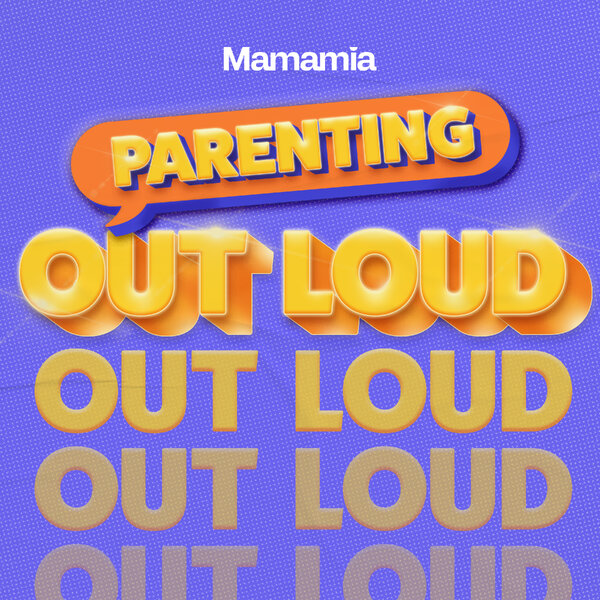'My daughter was refusing to attend school. It's not for the reason you might think.'

Content warning: This post includes descriptions of disordered eating.
Body dissatisfaction is stopping nearly half of young people in Australia from attending school.
Devastating new research from the Butterfly Foundation, with the Body Kind Youth Survey found 48.5 per cent of young people are skipping school because they don't like the way they look and more than half are dissatisfied with their bodies in general.
It's a reality Michael* knows all too well.
He and his wife have three daughters and a son, and say the past four years have been the hardest his family has ever had to navigate.
Their second eldest, *Lily, struggled with school attendance for years.
"A few years ago her anxiety was quite bad, and she was grappling with ADHD and learning disabilities. She's a really sporty kid, so it was hard to detect a change because she's always been very fit and quite slim. But then she began to manage her diet more restrictively. She was really worried about how she looked, she was exercising more and more," explains Michael.
There was also horrific body shaming taking place at Lily's school.
"She was at an all girls' school in year nine and some students would put on various social media channels photos of other students who weren't eating salad at school, as if there was something 'wrong' with that. Lily, 15, was on Instagram a lot during that time and of course that influences your body image.
"She just continually kept saying, 'I'm fat.'"
Watch: improving kids' body image. Post continues below.
From here Lily would often refuse to attend school and sometimes wouldn't even leave her bedroom.
Worried about their daughter, Michael and his wife took their daughter to a specialist.
"They confirmed that Lily had anorexia. Looking back she was grossly malnourished and not in a good headspace. By the time her brain became so malnourished, all rationale went out the window for her. It was really hard to get it back. That diagnosis was the beginning of our journey through five different hospitals and desperately trying to help her."
Another parent, Lisa*, knows how hard it is to watch your child deal with body dissatisfaction.
Last year, her son would often refuse to attend high school because he was worried what his peers thought of his body.
"A big part was that he was struggling with how he looked. He's on the smaller side and he had really bad acne. He was taking a lot of protein powder to try and bulk up but it was affecting his skin too. He felt so much pressure to look a certain way," she tells Mamamia.
Kathy's* daughter 14-year-old daughter, Grace*, "religiously fake tans" and applies "copious amounts of makeup" before school. If she doesn't follow her strict appearance routine, she feels "desperately anxious" to attend classes, for fears she will be judged by her peers for not being "pretty enough".
Kate's* nephew is only nine and sometimes refuses to go to school swimming activities because he's been called "fat".
"He's very active and sporty, so he loves participating and competing in everything. But when it comes to swimming carnivals or lessons, he has not shown the same enthusiasm."
Stephanie Damiano is the Manager of the Butterfly Foundation's primary school body image program.
Speaking with Mamamia, she says that body dissatisfaction is limiting young people's involvement in a whole range of things. She says there is a variety of signs for parents to be on the lookout for, all revolving around a change in habits and perceptions of body and eating.
"We want to look for changes in how a young person is thinking, feeling and behaving. Are they being picky around eating food all of a sudden? Do they criticise their bodies and are they complaining about how they look? Are they becoming obsessive with social media and becoming preoccupied in their appearance or their body size? Perhaps they're becoming restrictive with food and exercise too," says Stephanie.
"Parents know their child best and if they notice any of these signs or they have any concerns, no matter how small it is, it's important to seek help as early as possible. Body dissatisfaction is a key risk factor for the development of an eating disorder. And the earlier we can intervene, the better the outcomes for a young person."
Lael Stone is an educator, consultant and counsellor who has been working with families for over 20 years. She is also the co-author of Raising Resilient and Compassionate Children.
She says that in her professional experience she is coming across more and more kids who are dealing with body dissatisfaction.
"It's alarming, especially because youth are seeking help for their disordered eating or body image issues at younger and younger ages. I've worked with parents who have six-year-olds that are struggling with how their body looks," she tells Mamamia.
"Especially when puberty hits — and around this age kids are getting social media for the first time — they don't feel like they're enough just the way they are."
Lael also notes that parents know best when it comes to their kids' mental health. It's just about being attuned and "looking for anything that's a bit out of the ordinary".
But there's something far more important that all parents can do in the meantime.
"We carry so much shame around our own bodies. The first step is modelling to our kids what healthy body image and balanced eating looks like," says Lael.
"Kids are like sponges. They pick up on the phrases we say about our own bodies, and we don't want them to mirror that same negative self-talk. Our bodies do a lot of amazing things, so we should make sure we focus on that instead."
Now Lily is in year 12. She has since changed schools and is now at a new school that fosters a very caring and supportive environment, her dad says.
For two years Lily has been in recovery, and her relationship with food and exercise is far better. It's been a challenging period for the whole family.
"It's been a real journey of emotions, like the five stages of grief. No matter how hard it was though, we kept reminding her 'We're not leaving you, we will be here all the time and throw everything at trying to help you get better.' We were just lucky that something clicked and she felt determined and strong enough to change her life," says Michael.
"I think social media has a lot to answer to, and I support the current movement to raise the age of kids having access to it from 13 to 16. Even us as adults don't have the emotional intelligence to deal with the how social media can feed our insecurities."
He says that one of the biggest lessons he's learned as a parent from this experience is that as a collective we need to try and stop commenting on people's body shape. Michael adds that it would be great if schools had body image education that was of the same calibre as their sex and consent education now.
"All we wanted to do as parents was make sure our daughter knew she deserved to feel worthy and good about herself. Eating disorders are a mental health condition. Helping her realise that it wasn't her fault and that we loved her unconditionally made her feel supported during that time and through to recovery. We're just really thankful and lucky that she's on the mend."
*These parents' identities are known to Mamamia.. They have chosen to keep their names anonymous for privacy reasons.
For help and support for eating disorders, contact the Butterfly Foundation's National Support line and online service on 1800 ED HOPE (1800 33 4673).
Feature Image: Canva.
As women our bodies are constantly changing! Tell us about your experience and go in the running to win one of four $50 gift vouchers.
Your top news stories of the day, in your inbox every weekday.
